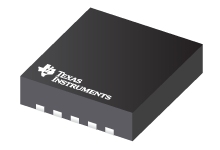Datasheet Texas Instruments TPS61087DRCR — Datenblatt
| Hersteller | Texas Instruments |
| Serie | TPS61087 |
| Artikelnummer | TPS61087DRCR |

18,5 V, 3,2 A, 650 kHz / 1,2 MHz Aufwärts-DC / DC-Wandler mit erzwungenem PWM-Modus 10-VSON -40 bis 85
Datenblätter
TPS61087 650-kHz,1.2-MHz, 18.5-V Step-Up DC-DC Converter With 3.2-A Switch datasheet
PDF, 1.4 Mb, Revision: D, Datei veröffentlicht: Dec 17, 2014
Auszug aus dem Dokument
Preise
Status
| Lifecycle Status | Active (Recommended for new designs) |
| Manufacture's Sample Availability | Yes |
Verpackung
| Pin | 10 |
| Package Type | DRC |
| Industry STD Term | VSON |
| JEDEC Code | S-PDSO-N |
| Package QTY | 3000 |
| Carrier | LARGE T&R |
| Device Marking | PMOQ |
| Width (mm) | 3 |
| Length (mm) | 3 |
| Thickness (mm) | .9 |
| Pitch (mm) | .5 |
| Max Height (mm) | 1 |
| Mechanical Data | Herunterladen |
Parameter
| Duty Cycle(Max) | 90 % |
| Iq(Typ) | 0.075 mA |
| Operating Temperature Range | -40 to 85 C |
| Package Group | VSON |
| Rating | Catalog |
| Regulated Outputs | 1 |
| Special Features | Enable,Frequency Synchronization,Power Good |
| Switch Current Limit(Min) | 3.2 A |
| Switch Current Limit(Typ) | 4 A |
| Switching Frequency(Max) | 1500 kHz |
| Switching Frequency(Min) | 900 kHz |
| Type | Converter |
| Vin(Max) | 6 V |
| Vin(Min) | 2.5 V |
| Vout(Max) | 18.5 V |
| Vout(Min) | 3 V |
Öko-Plan
| RoHS | Compliant |
Design Kits und Evaluierungsmodule
- Evaluation Modules & Boards: TPS61087EVM-317
TPS61087 Evaluation Module
Lifecycle Status: Active (Recommended for new designs)
Anwendungshinweise
- Discrete Charge Pump Design (Rev. A)PDF, 190 Kb, Revision: A, Datei veröffentlicht: Jul 16, 2010
Many applications require an auxiliary power supply in addition to a primary power supply. For example, TFT-LCD applications can require +20 V to +30 V and +10 V to +20 V. As a result of cost, board space, or inventory, a separate converter may not be appropriate for some applications. This document demonstrates a simple charge pump circuit that provides the auxiliary positive voltage using the TP - Low Cost 1W Isolated Power Supply Solution with TPS61085PDF, 175 Kb, Datei veröffentlicht: Jun 26, 2012
- AN-2020 Thermal Design By Insight, Not Hindsight (Rev. C)PDF, 568 Kb, Revision: C, Datei veröffentlicht: Apr 23, 2013
This application report provides an in-depth discussion of thermal design. - Minimizing Ringing at the Switch Node of a Boost ConverterPDF, 201 Kb, Datei veröffentlicht: Sep 15, 2006
The application report explains how to use proper board layout and/or a snubber to reduce high-frequency ringing at the switch node of a boost converter. - Design considerations for a resistive feedback divider in a DC/DC converterPDF, 393 Kb, Datei veröffentlicht: Apr 26, 2012
- Basic Calculation of a Boost Converter's Power Stage (Rev. C)PDF, 186 Kb, Revision: C, Datei veröffentlicht: Jan 8, 2014
This application note gives the equations to calculate the power stage of a boost converter built with an IC with integrated switch and operating in continuous conduction mode. It is not intended to give details on the functionality of a boost converter (see Reference 1) or how to compensate a converter. See the references at the end of this document if more detail is needed. - PowerPAD Thermally Enhanced Package (Rev. H)PDF, 983 Kb, Revision: H, Datei veröffentlicht: Jul 6, 2018
- Understanding the Absolute Maximum Ratings of the SW Node (Rev. A)PDF, 755 Kb, Revision: A, Datei veröffentlicht: Jan 13, 2012
- Extending the Soft Start Time Without a Soft Start Pin (Rev. B)PDF, 387 Kb, Revision: B, Datei veröffentlicht: Jun 15, 2017
- QFN and SON PCB Attachment (Rev. B)PDF, 821 Kb, Revision: B, Datei veröffentlicht: Aug 24, 2018
- IQ: What it is what it isn’t and how to use itPDF, 198 Kb, Datei veröffentlicht: Jun 17, 2011
- Performing Accurate PFM Mode Efficiency Measurements (Rev. A)PDF, 418 Kb, Revision: A, Datei veröffentlicht: Dec 11, 2018
When performing measurements on DC-DC converters using pulse frequency modulation(PFM)or any power save mode proper care must be taken to ensure that the measurements are accurate. An accurate PFM mode efficiency measurement is critical for systems which require high efficiency at low loads such as in smart home systems tablets wearables and metering.
Modellreihe
Serie: TPS61087 (6)
- TPS61087DRCR TPS61087DRCRG4 TPS61087DRCT TPS61087DRCTG4 TPS61087DSCR TPS61087DSCT
Herstellerklassifikation
- Semiconductors > Power Management > Non-isolated DC/DC Switching Regulator > Step-Up (Boost) > Boost Converter (Integrated Switch)